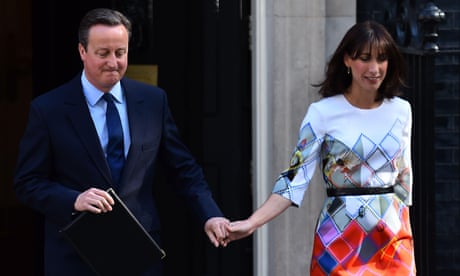The British vote has dealt an irreparable blow to the European project, and the shock is hard to exaggerate. Yet if there is one mistake EU leaders should avoid now, it would be to think that the forces at play represent a strictly British phenomenon. Twin dynamics have been brutally exposed: the breakdown of the link connecting British voters to elites and institutions – who all argued for remain – and the rapidly fading connection between citizens across the continent and EU institutions.

David Cameron thought victory was his at 10pm on Brexit eve
It’s true that Britain is a special case in Europe. It joined belatedly, and purely for economic reasons. It has had all sorts of opt-outs. For years it fought for and won special statusfor a specific status and it got it in diverse ways. This was a product of Europe’s past – not just of British identity or domestic politics, or even the media environment. Unlike postwar France and Germany, Britain – as Jean Monnet, the father of the EU, acknowledged in his memoirs – “felt no need to exorcise history”.
But this vote is not one that affects Britain alone, and for which just one country will bear the consequences. It puts the cohesion and strength of western liberal democracies at stake in a global environment plagued with uncertainties. Picking up the pieces of this wreckage will require clear-headed decisions and a new approach across Europe. Whether that will happen is now the big uncertainty.
The first thing to avoid is going into denial about the magnitude of what has happened. Now populist, far-right and anti-western forces will push forward in the belief that a precedent has been set for other “exits”. Look at the statements from Marine Le Pen, the head of France’s Front National, and the Dutch far-right leader Geert Wilders – and the messaging from the Kremlin’s propaganda machine.
The very survival of the EU is now in peril, and not just because a country representing its second largest economy and a key pillar of its security is set to withdraw. Surely, that much is clear to all. Yet some reactions are already baffling. Angela Merkel has solemnly called for calm. François Hollande has declared that there needs to be a “refoundation” of the EU. Donald Tusk, European council president, quotes Nietzsche: “What doesn’t kill you makes you stronger.” Martin Schulz, president of the European parliament, believes “the chain reaction being celebrated everywhere now by Eurosceptics won’t happen”.

Dutch Party for Freedom leader Geert Wilders. ‘Now populist, far-right and anti-western forces will push forward in the belief that a precedent has been set for other ‘exits’.’ Photograph: Laszlo Balogh/Reuters
Stand by for more such delusional talk in the days and weeks to come. Most will betray the angst of damage limitation rather than a recognition that one era has ended and the new is not yet born.
But if there is one lesson, it is that the usual rituals of the EU simply won’t do. Diplomatic choreography won’t be enough to restore what has been shattered, and what the Brexit vote has starkly reflected: there is no longer confidence among European citizens that a collective endeavour of solidarity and values can deliver what they need and want.
The confidence of the lower and middle classes is now closer to zero than it ever has been. Remember recent surveys: only 38% of the French view the EU positively today (the same poll said it was 44% of the British).
The French historian Fernand Braudel once wrote that “history can be divided into three movements: that which moves rapidly, moves slowly and appears not to move at all”. History is now accelerating right before our eyes. It is moving swiftly in a bad direction, and for those who, as I did, witnessed the spread of democracy and the reunification of the continent that followed the fall of the Berlin Wall in 1989, or who were brought up to think that Europe’s future lay in the coming together of its disparate parts, it is an ominous and painful moment.
The British divorce will be messy and drawn out. It will divert energy needed to address other challenges like security, unemployment, migration, and the geopolitical chaos in the EU’s neighbouring regions. It could make it even harder to address the gap that increasingly divides the political elites from the public mood across the continent. Pro-EU politicians are in denial if they think more European integration slogans are the solution. Citizens simply won’t buy it. For more than 10 years now, EU-related referendums have been a disaster. The federalist-minded European constitution project was rejected in 2005, and this year the Netherlands voted against an EU association agreement with Ukraine. Hungary is due to hold a referendum on EU refugee quotas. Expect a no.
If something can be salvaged, the EU needs to rebuild itself from the ground up, not top down. It is a folly to think measures to fix eurozone governance will suffice, however needed those may be. Anyone who has regularly travelled across Europe in recent years and sounded out grassroots perceptions knows that something else is lacking: a sense of purpose, a belief that Europe stands for something positive and that it can act in people’s interest.
The European project was built by a small group of visionary politicians in the 1950s who believed that citizens would over time see its positive impact on their lives. For a long time that’s what happened. And many young people, including in the UK, do grasp the advantages. But for many reasons that link is in danger, and if it is further weakened Europe will unravel. This is the one priority that should obsess those who sit in Brussels and people everywhere who care about preserving fundamental values. If trust and hope are not restored in the notion that the EU can be democratic in its functioning and deliver concrete outcomes to citizens, the Pied Pipers of populism will continue to attract confused electorates. More illiberalism and toxic divisions will seep into the continent. This vote is a wake-up call: Europe needs saving.
The confidence of the lower and middle classes is now closer to zero than it ever has been. Remember recent surveys: only 38% of the French view the EU positively today (the same poll said it was 44% of the British).
The French historian Fernand Braudel once wrote that “history can be divided into three movements: that which moves rapidly, moves slowly and appears not to move at all”. History is now accelerating right before our eyes. It is moving swiftly in a bad direction, and for those who, as I did, witnessed the spread of democracy and the reunification of the continent that followed the fall of the Berlin Wall in 1989, or who were brought up to think that Europe’s future lay in the coming together of its disparate parts, it is an ominous and painful moment.
The British divorce will be messy and drawn out. It will divert energy needed to address other challenges like security, unemployment, migration, and the geopolitical chaos in the EU’s neighbouring regions. It could make it even harder to address the gap that increasingly divides the political elites from the public mood across the continent. Pro-EU politicians are in denial if they think more European integration slogans are the solution. Citizens simply won’t buy it. For more than 10 years now, EU-related referendums have been a disaster. The federalist-minded European constitution project was rejected in 2005, and this year the Netherlands voted against an EU association agreement with Ukraine. Hungary is due to hold a referendum on EU refugee quotas. Expect a no.
If something can be salvaged, the EU needs to rebuild itself from the ground up, not top down. It is a folly to think measures to fix eurozone governance will suffice, however needed those may be. Anyone who has regularly travelled across Europe in recent years and sounded out grassroots perceptions knows that something else is lacking: a sense of purpose, a belief that Europe stands for something positive and that it can act in people’s interest.
The European project was built by a small group of visionary politicians in the 1950s who believed that citizens would over time see its positive impact on their lives. For a long time that’s what happened. And many young people, including in the UK, do grasp the advantages. But for many reasons that link is in danger, and if it is further weakened Europe will unravel. This is the one priority that should obsess those who sit in Brussels and people everywhere who care about preserving fundamental values. If trust and hope are not restored in the notion that the EU can be democratic in its functioning and deliver concrete outcomes to citizens, the Pied Pipers of populism will continue to attract confused electorates. More illiberalism and toxic divisions will seep into the continent. This vote is a wake-up call: Europe needs saving.
No comments:
Post a Comment